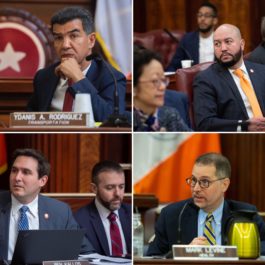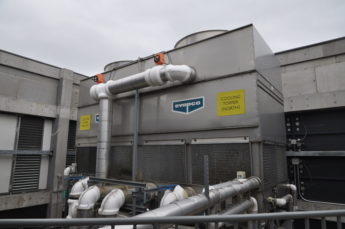
Council Members Ydanis A. Rodriguez, Rafael Salamanca Jr., Ben Kallos and Mark Levine Image Credit: City Council
The additional bills should help the public and City administration react in the fight against Legionnaire’s disease. On March 28, 2019, the City Council approved Int. No 1158, 1149-B, 1164-A and 1166-A, a package of bills regarding the maintenance and inspection of cooling towers. The bills assist in the implementation and enforcement of Local Law 77 of 2015, which was enacted in response to an outbreak of Legionnaire’s disease. The bills respectively address public information availability, electronic reminders for inspection and certification, annual reporting and future assessments of cooling towers.
The bills were first introduced on October 17, 2018, then heard at a joint hearing between the Committee on Housing and Buildings and the Committee on Health on October 23, 2018. Intros 1158 and 1149-B were approved by the Committee on Housing and Buildings on March 25, 2019, and Intros 1164-A and 1166-A were approved by the Committee on Health on March 26, 2019. The bills were ultimately approved by the City Council on March 28, 2019, adopted by the administration and was returned unsigned by the Mayor on April 30, 2019.
The Bills
Intro 1158, sponsored by Council Member Mark Levine and nine other council members, requires the Commissioner of the Department of Health and Mental Hygiene, in consultation with the Department of Buildings, to hold at least two information sessions a year regarding the maintenance, cleaning and inspections of cooling towers. The bill also requires that the Health Commissioner post the same information on the department’s website in simple and understandable terms. You can access the website, here.
Intro 1149-B, sponsored by Council Member Ben Kallos and five other council members, requires the Department of Health and Mental Hygiene send electronic reminders of the annual filing deadline to owners and operators of cooling towers. The electronic reminder includes a link where the certification can be submitted. The bill also mandates cooling tower inspectors to report to the Department of Health and Mental Hygiene in real time.
Intro 1164-A, sponsored by Council Member Ydanis A. Rodriguez and five other council members requires the Department of Health and Mental Hygiene to annually report to the Council, the results of building cooling tower inspections and Legionella cases. Afterwards such results must be made available online.
Intro 1166-A, sponsored by Rafael Salamanca Jr. and nine other council members, requires the Department of Health and Mental Hygiene to conduct a year-long assessment of potential determinants of Legionnaire’s disease throughout the city. The Department of Health and mental Hygiene would then share these findings with the council.

Standard cooling tower/unit Image Credit: DOB
Background
In 2015, the city experienced an outbreak of Legionnaires’ disease, resulting in the enactment of Local Law 77. Local Law 77 (2015) essentially mandates the registration and inspection of cooling towers. In order to avoid fines, the owner or operator of a cooling tower must annually certify that their respective cooling tower(s) was inspected, tested, cleaned and disinfected in accordance with Health and Mental Hygiene’s standards. These four bills are complementary to the purpose of Local Law 77 (2015).
Cooling towers are designed to remove heat from a building or facility by spraying water down through the tower to exchange heat from inside of the building. Air comes in from the sides of the tower and passes through the falling water. As the air passes through the water, heat is exchanged and some water evaporates. The cooled water is collected at the base of the tower and pumped back into the building for reuse. Cooling towers are primarily used for heating, ventilation and air conditioning (HVAC) and industrial purposes. Since cooling towers contain large amounts of water, they poses as a potential breeding ground for Legionella bacteria, a heat-loving bacteria.
Legionnaires’ disease can be contracted when a person breathes in water containing the bacteria. It is a type of pneumonia that results in flu-like symptoms and complications. Complications can sometimes be fatal. Symptoms include fever, chills, muscle aches and a cough. One might also experience headaches, fatigue, loss of appetite, confusion or diarrhea. Smokers and those with weak repertory systems are particularly susceptible to Legionnaires’ disease. If experiencing these symptoms one should seek medical attention right away.
Maintenance
If someone owns or operates cooling towers, fluid coolers or evaporative condensers they must be registered through the Cooling Tower Web Portal. You can access the portal, here. Failure to certify or maintain cooling towers in accordance with the mandated standards can result in civil fines ranging from $250 to $2,000. You can view the Department of Health and Mental Hygiene’s penalty schedule, here.
Public Hearing
At the public hearing on October 23, 2018, Dr. Demetre Daskalakis, the Deputy Commissioner of Disease Control for the Department of Health and Mental Hygiene testified in support of each bill. Dr. Daskalakis also took a moment to relay that “New York City’s drinking water supply is safe, as are home air condition units; walking into air conditioned environments is also safe.
The Alliance to Prevent Legionnaire’s Disease submitted testimony that urged “City Council members and other City officials to look beyond the narrow approaches that focus only on one component and examine the system. We support a more comprehensive approach to the prevention of Legionnaires’ disease that, in addition to proper management of building equipment, equally focuses on steps that can be taken- both short and long term- to reduce Legionella health risks originating in the public water supply system.”
Effective Dates
- Intro 1158, now Local Law 77 (2019), went into effect July 27, 2019.
- Intro 1149-B, now Local Law 76 (2019), went into effect October 25, 2019.
- Intro 1164-A, now Local Law 78 (2019), went into effect July 27, 2019.
- Intro 1166-A, now Local Law 79 (2015) went into effect immediately on April 28, 2019.
By: Jason Rogovich (Jason Rogovich is the CityLaw Fellow and New York Law School Graduate, Class of 2019)


I wrote a paper describing how the Department of Mental Health and Hygiene are inspecting cooling towers yearly, but in a less than ideal manner. Currently (I FOI’d them) they que the cooling towers to be inspected based on when they were last inspect, chronologically. I suggested that a better manner of applying their manpower would be to require all cooling tower owners to submit efficiency calculations on their cooling towers. The towers would then be queued for inspection based on those efficiency numbers, with the least efficient cooling towers being inspected first as well as more often. Legionella flourishes in the same environment as an inefficient cooling tower. This calculation can be performed and monitored real time on a Building Maintenance Computer, much as NOX emissions are monitored on boilers. Just a heads-up.
Thanks,
Chris
NYC should be commended on this legislation. As they lead the nation in enacting laws to help fight Legionellosis.
Hopefully, they will continue this leadership by adopting industry standards into municipal codes. ASHRAE Standard 188-2018 provides valuable language confirming the need for Water Management Programs to safeguard building water systems from the growth and spread of legionella bacteria.
If NYC can produce codes from this valuable ASHRAE Standard for which the CDC has already confirmed as an industry standard, then the potential to slow down or reverse the climbing trend of Legionairres Disease cases can be expected.
In any case, this is a huge step in the right direction!
So, where are the more recent 2018 and 2019 reports on the cooling towers going to be shared or made available to the public? They seem to not even exist. The laws are already in effect.